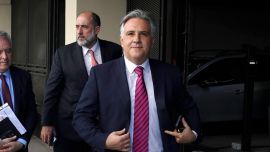Argentina’s lower house Chamber of Deputies opened debate on President Javier Milei’s mega reform package known as the ‘Omnibus’ bill on Wednesday, with the government confident it has the votes it needs to secure its approval.
With no surprises, the ruling party achieved a comfortable quorum in the lower house and the special session on the ‘Ley de Bases y Puntos de Partida para la Libertad de los Argentinos’ without delay.
The ruling party was guaranteed the floor of 129 deputies to enable the session after the Unión Cívica Radical, PRO, Hacemos Coalición Federal and Innovación caucuses said that they would collaborate. Sources expect that they will "vote in general" for the majority opinion, while going against key articles.
A total of 137 deputies were seated at 10.30am, enabling Lower House Speaker Martín Menem to open the session. Lawmakers from the Unión por la Patria and the Frente de Izquierda caucuses did not collaborate.
Milei’s bill, which also seeks to privatise dozens of companies and expand his executive powers on economic matters, narrowly passed three congressional committees last week. To get it to a vote, the government was forced to give ground in several key areas, including eradicating the entirety of its fiscal chapter.
Amendments to the ‘Ley de Bases’ has seen it shrunk in size from more than 660 articles to around 385.
With the negotiations mostly concluded, the government is confident the bill will make it past the finish line in Congress. For the law to pass the lower house and head to the Senate, it needs a simple majority, 129 votes of 257.
The numbers so far indicate that the bill will win general approval and the government is confident it has them thanks to the pro-dialogue sector of the opposition.
However, there is intrigue as to what will remain of it at the close of the session – the ruling party could suffer some key defeats when it is voted for article-by-article. The UCR bloc, for example, has already announced that, while it will generally support the bill, it will not hold back on several articles, such as those privatisations of state firms.
According to a tally kept by the Perfil newspaper, La Libertad Avanza and its allies provide 41 votes in favour, with another 39 to come from PRO. Another 34 votes could come from the UCR caucus, with 17 from Miguel Ángel Pichetto’s Hacemos Coalición Federal. Within Innovación, a federal space that responds to governors of several provinces, there are at least three more in favour. That would provide them with, in theory, 134 votes.
The government expects at least 108 votes against, mostly from the Unión por la Patria (Peronist) opposition caucus. Two from Hacemos Coalición Federal, five from the Frente de Izquierda and two from other spaces make up the rest.
At least eight lawmakers have not stated their position.
"There is a difference with respect to some of the articles that are still being negotiated," said UCR lawmaker Martín Tetaz.
The debate starting Wednesday is expected to last more than 35 hours, stretching over multiple days. The ruling party has proposed at least four intermissions for the session, including one at a “reasonable time on Wednesday night to give the legislators a few hours of rest to replenish their energy,” Noticias Argentinas reported. The session is expected to resume sometime after 10am on Thursday morning.
Confidence
Interior Minister Guillermo Francos expressed confidence on Wednesday morning that the government has the numbers to pass the law.
"We believe that there is a majority consensus to approve the law. Besides, I do not see why it should not be approved,” said the Cabinet official in an interview with Radio Rivadavia.
“A number of issues raised by the different sectors have been taken into account and several modifications have been made. The law benefits not only the Argentine people as a whole, but also the provinces,” he argued.
Francos also pushed back on criticism of one of the more controversial proposals: Milei’s request for emergency powers.
"All presidents have had the declaration of emergency, delegated powers even broader than those proposed in this law, for a long time, and nobody has complained," he declared.
Police and security forces began securing the streets in the immediate vicinity of the National Congress building on Wednesday as lawmakers began arriving.
On Avenida Rivadavia, in the direction of the neighbourhood of Once, Gendarmerie trucks with water cannons, police vehicles and security equipment stretched for two blocks.
At the nearby Plaza del Congreso, facing the Legislature, things were calmer as people were already milling around ahead of an overnight “vigil” called by rights groups, unions, social organisations and student protesters.
The groups, which include Polo Obrero (PO) and the Coordinadora Sindical Clasista (CSC), have vowed to demonstrate for the duration of the Congress session, framing the rally as part of the “plan of struggle” against the proposed reforms.
Left-wing lawmakers Romina Del Plá, Gabriel Solano and Néstor Pitrola, of the Frente de Izquierda y Trabajadores – Unidad party issued a statement on Tuesday calling on their peers to “reject the Omnibus Law ... and the whole plan of Milei's government."
Milei, a libertarian and self-described "anarchocapitalist," took office in December vowing to slash spending and end decades of economic crisis. Annual inflation is running at more than 200 percent and poverty affects more than 40 percent of the country.
He began his mandate by devaluing the peso by more than 50 percent, cutting state subsidies for fuel and transport, reducing the number of government ministries by half, and scrapping hundreds of rules to deregulate the economy.
Milei notably was forced to remove a set of tax reforms he had hoped would help his government cut five percent of spending, and a highly controversial modification on how pensions are calculated.
– TIMES


























Comments